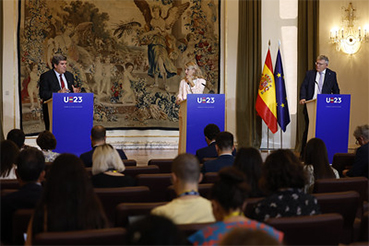The Employment and Social Policy Council of the European Union (EPSCO) approved the European Commission Recommendation for the development of framework conditions for the Social Economy on 9 October in Luxembourg. The Spanish Government, through its Vice-President and Minister of Employment and Social Economy, Yolanda Díaz, has led the negotiations for the approval of this Resolution within the framework of the Spanish Presidency of the Council of the EU.
The Recommendation urges the Member States of the European Union to promote measures and policies to foster the social economy in all areas, especially in employment policies. This first Council Recommendation on the social economy also includes measures to increase the visibility and recognition of the sector and states that social economy organisations make a significant contribution to social protection systems by complementing public services, revitalising rural and depopulated areas in Europe, and playing an important role in international development policy.
Furthermore, the Recommendation calls on Member States to explore possibilities to facilitate the participation of the social economy in social dialogue by involving social economy organisations in the design and implementation of active labour market policies.
In addition to these measures, this Recommendation advises Member States to ensure that social economy policy is linked to industrial policy and to the digital and ecological transitions. It also includes measures to facilitate the access of social economy organisations to public and private funding, making the best possible use of EU funds, and to promote social innovation and sustainable development, among other aspects.
Towards 20 million jobs in the EU by 2030
Social Economy Europe (SEE) welcomed the recently approved Recommendation of the European Commission. For the President of SEE, Juan Antonio Pedreño, this Recommendation allows EU member states to “move forward together in their commitment to the social economy, a business model that represents more than 2.8 million companies and organisations and employs more than 13.6 million people throughout Europe”. “This Recommendation envisages an innovative roadmap that will enable the creation of more companies and jobs in the Social Economy, to reach 20 million jobs by 2030”, added Pedreño.
Furthermore, the SEE President recalls that this agreement will be highlighted at the next European Social Economy Summit, which will bring together in San Sebastian on 13 and 14 November 2023 governments, European institutions, international organisations such as the OECD, ILO and CIRIEC, as well as business leaders in the social economy.







